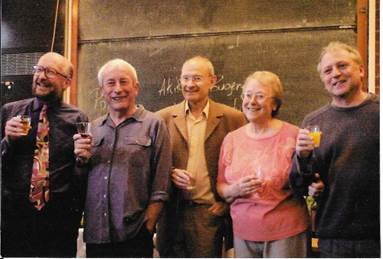Ladislaus Löb

Nicolas Tredell, Jim McGivney, Laci Löb, Rosemary Leech, Alistair Davies at the conclusion of the International Summer School 2005, directed by Laci.
Ladislaus (Laci) Löb, the last but one Professor of German at Sussex University, died in Zürich, Switzerland, on 2nd October 2021 from complications after a fall. Laci had reached a venerable age but when he celebrated his 88th birthday on 8th May this year he was, characteristically, working on another major translation—and he remained mentally alert and actively polyglot to the end; on the day before he died he was speaking in Italian to his grandson who had come to see him from Padua, where he is studying. A distinguished scholar of the literature of the German Enlightenment, particularly its drama, and an accomplished translator from Hungarian and German, Laci also wrote invaluable first-hand accounts of the Nazi extermination of Romanian and Hungarian Jewry and of the “luck” of his own survival. As he put it himself:
If “luck” is a relative concept I can call myself lucky. I lost the majority of my family in the Holocaust. I was persecuted in antisemitic Hungary. I spent five months in Bergen-Belsen as a child of 11, but I was spared Auschwitz and granted asylum in Switzerland while Nazi Germany was still trying to win the war it had started.
Laci was born in 1933 into a Hungarian-speaking middle-class Jewish family in a shtetl (small town) near Cluj (Kolozsvár) in Transylvania in Romania. In 1944, at the age of eleven, he was deported, along with his father (his mother had died from tuberculosis in 1942), to Bergen-Belsen concentration camp, then freed after five months with some 320 others as a result of a controversial deal with Adolf Eichmann brokered by Rezső Kasztner, who was, in Laci’s words, “a Zionist activist” and “the leader of an illegal ‘Relief and Rescue Committee’, formed to save Jews from the Nazis”. Laci’s book Dealing with Satan (2008), which he was unable to write until his seventies, offers a harrowing account of his experiences at that time, drawing on the testimony of other survivors as well as his own, and provides a well-researched and balanced defence of Kasztner, who was later assassinated and who remains an incendiary figure in some quarters. The book won the Austrian Holocaust Memorial Award in 2012. One of Laci’s adult fellow prisoners in Bergen-Belsen was Béla Zsolt, whose powerful memoir, Kilenc koffer [Nine Suitcases], he would later be the first to translate from Hungarian into English.
After his release, Laci was, with his father, granted asylum in Switzerland and resumed his formal education, eventually obtaining a Doctorate in Philosophy at the University of Zürich for a thesis on J. B. Priestley (he enjoyed quoting F. R. Leavis’s mordant remark in The Great Tradition that life was not long enough to permit of one’s giving any time to Mr Priestley). In 1963, after a brief career as a teacher and journalist in Switzerland, he came to England to teach German literature and language at the University of Sussex (his recollections of the fluid and innovative early years of the university’s history were fascinating), and he enjoyed a long and successful career there until his retirement. Talking with Laci, on and off campus, gave the liberating sense of moving between and across cultures and languages—he spoke Hungarian, German, English, French and Italian. He sometimes likened himself to “Here Comes Everybody” (HCE, aka H. C. Earwicker) in James Joyce’s Finnegans Wake.
Laci summed up his movements between nationalities in this way: “Having been a Romanian and Hungarian citizen, I am now Swiss and British by naturalisation”. In 2017, he returned with his wife Sheila to the country that had given him refuge after Bergen-Belsen and finished an English translation—another first—of Kurt Guggenheim’s Alles in Allem. Laci described this as “a vast panoramic novel set in Zürich from 1900 to 1950” which evokes the transformation of “a rural community into a dynamic modern city”. This translation is both a gift to his English-language readers and to his compatriots in Zürich who had made his long and rich career possible. He will be remembered for his remarkable learning, his warmth, his courtesy, his kindness and his very dry wit by colleagues and students at Sussex and by the many participants, drawn from across the globe, in the Sussex Summer School of which he was Director for several decades before and after his retirement. His was an extraordinary life and he was an extraordinary man.
Alistair Davies and Nicolas Tredell
22nd October 2021
Sources
Löb, Ladislaus, “Ladislaus Löb”, Holocaust Memorial Day Trust, Holocaust Memorial Day Trust | Ladislaus Löb (hmd.org.uk).
____________ “Synopsis: Kurt Guggenheim, Alles in Allem”, unpublished.
Davies, Alistair, photo at International Summer School 2005.